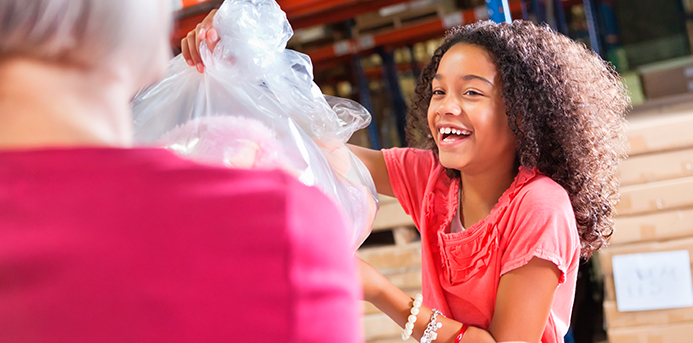The question “How do your parents support organizations or causes?” was posed to children ages 17 and under in a 2010 survey by The Mint.
Nearly 65 percent of the participants answered, “I don’t know.”
Don’t let your children fall into that 65 percent. With the holidays and New Year approaching, you will be spending lots of time with your children. Here are some ways you can help them start to understand why you give to others and why they should too:
1. Start a discussion.
It’s easy to tell your children that giving back is important, but have you ever gotten their perspective? Ask your child why they think charity is important or what charity means. If he or she seems to have trouble coming up with an answer, feel free to prompt them with more specific questions:
- “Why is it important to help someone who is hungry?”
- “Why did you collect canned food with your classmates this year?”
- “Why do we bring clothes to the Salvation Army?”
2. Volunteer together.
Give your children an experience that will make the act of giving tangible. There are many volunteer opportunities for families around the holidays, like serving food at soup kitchens, delivering groceries to a food bank, or purchasing gifts for families in need. Children learn by example, so when you volunteer as a family you can show them how important it is to you and in turn, how important it should be to them.
–Sheil Catholic Center on Sheridan Road offers volunteer opportunities for individuals, groups and families every Sunday evening at Evanston Soup Kitchen, Hilda’s Place. For more information or to sign up, email Jolynn Houlihan at jolynn.houlihan@comcast.net.
–Northwestern University Settlement House offers volunteer opportunities for individuals and families at a variety of locations including their food pantry, Rowe Elementary School, Adventure Stage Chicago and House In The Wood. For more information or to sign up, contact Northwestern Settlement at 773-278-7471.
3. Expand their horizons.
The desire to give back often comes from feelings of empathy or understanding for those who are aren’t as fortunate or those facing difficult circumstances. Living in a safe, homogenous neighborhood on the North Shore, children may struggle to understand the world beyond their own backyard. Help broaden their perspectives.
For younger children you can start to do this by teaching them about cultural differences, such as the various holiday traditions children celebrate around the world.
What: Museum of Science and Industry’s 73rd annual Christmas Around the World and Holiday of Lights exhibit features information on Christmas celebrations and traditions everywhere from Armenia and Bosnia to Japan and Kenya.
When: The exhibit is open from now through Jan. 4.
Where: Museum of Science and Industry, 5700 S. Lake Shore Drive, Chicago
For older children, this could mean taking time to talk with them about social issues our society faces, such as hunger, poverty or racism.
What: The Illinois Holocaust Museum and YWCA Evanston/North Shore’s “RACE: Are We So Different?” exhibit is the first national exhibition to tell the stories of race from the biological, cultural, and historical points of view. The exhibit offers an unprecedented look at race and racism in the United States.
When: The exhibit is open now through Jan. 25.
Where: The Illinois Holocaust Museum and Education Center, 9603 Woods Drive, Skokie
4. Take Yourself Out of the Equation
Invite your children to come up with ways they can donate to a cause, volunteer or give back completely on their own. Whether your children choose to donate some of their favorite clothes or toys, bake and deliver cookies to friends or shovel an elderly neighbor’s driveway, they can feel 100 percent responsible for their actions. Children can also take this opportunity to insert their own personality or interests into their acts of giving which will make the giving feel more enjoyable. Acting independently will hopefully inspire your children to be more conscientious of charitable action when they are on their own, at school or spending time with friends.
For more information on teaching children the importance of giving please also read our article Sharon Morton: Living the Kedushah Principle: https://bit.ly/13mcIP2

